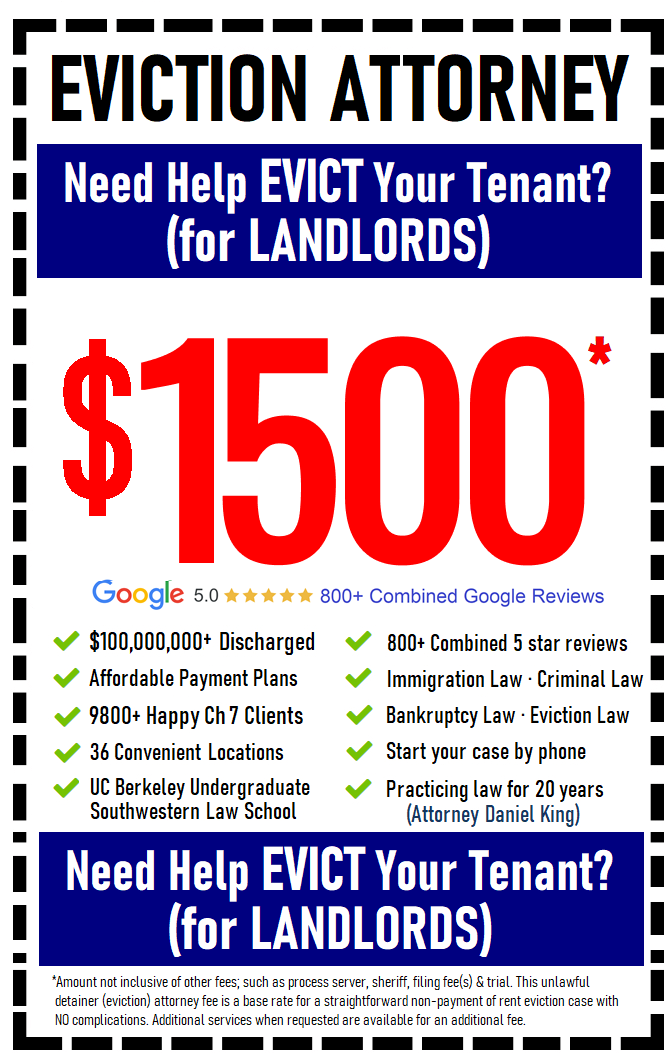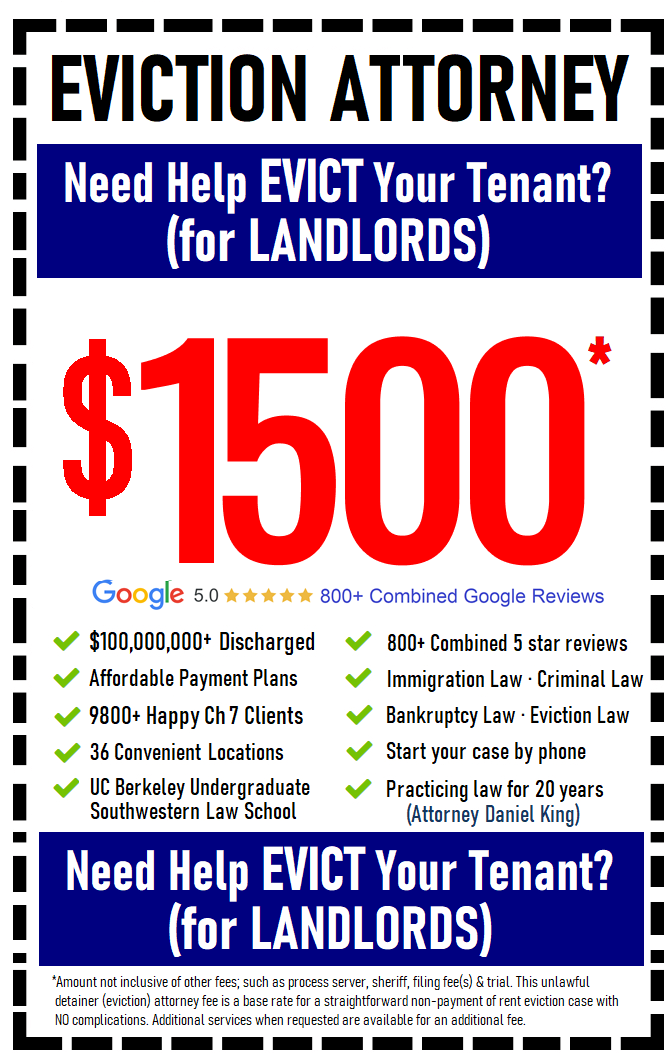|
Compton Eviction Attorney for Landlords. Evict your Tenant today - Eviction Lawyers serving Compton, California. If you are struggling to evict your tenant and looking to file an unlawful detainer in Compton, you've come to the right place. We have 36 locations to meet you in California.
Need immediate assistance? Contact us now!
Toll Free 1(888) 759-1274 Available 7 Days a Week 7am to 9pm 36 LOCATIONS IN CALIFORNIA 
Lawyers from the The Attorney Group work with landlords and ensure they follow proper legal procedures when trying to evict tenants who fail to pay their rent, cause substantial damage to their leased units or common areas, or otherwise engage in criminal activities. Evicting a Tenant Your written lease forms the basis for most evictions. It should be detailed enough to list the rent price, lease term, how to pay the rent, the parties’ obligations, the identities of the tenants, and what acts are a material breach of the lease that affords you the right to begin eviction proceedings. Examples of reasons or activities for which you can evict a tenant include:
You must be cautious and follow the proper procedures to evict a tenant. You cannot change the locks, enter the unit and remove the tenant’s belongings, or threaten them or you can face civil as well as criminal consequences. TYPE OF EVICTION NOTICE(S) 3-Day Notice Pay Rent or Quit: Failure to pay rent 3-Day Notice to Vacate: Damage to the property 3-Day Notice to Cure or Quit: Violating terms of the agreement - Remaining on the property after the lease is up 3-Day Notice to Vacate: Illegal uses of the property including drug use, production, or sales. Being a nuisance to other tenants 5-Day Notice to Vacate: Forcible Entry 3/90-Day Notice to Quit: Previous Owner Holdover Squatters in your property 30-Day Notice 60-Day Notice By following the proper procedures, you can evict an unwanted tenant. Our highly experienced lawyers from the Eviction Attorney Group can file all necessary documents and respond if necessary to any defenses raised by a tenant. Call the Eviction Attorney Group to ensure that your rights and property are protected. |

20
Years Experience
9,800+
Happy Ch 7 Clients
Daniel J King, Esq.
Managing Attorney / Owner
36 Locations
In California
800+ 5 Stars
Combined Reviews
AFFORDABLE
EASY Payment Plans
Phone Meetings
Start your case by phone
$100+ Million
Discharged
Daniel J King, Esq.
Managing Attorney/Owner
UC BERKELEY
Undergraduate
SOUTHWESTERN
Law School Free Consultation$100,000,000+ $100 Million Discharged |
|
Attorney Daniel J King
Education: UC Berkeley UndergraduateSouthwestern University School of Law
$100,000,000+
$100 Million Discharged
| 20 | 9,800+ |
| Years Experience | Happy Clients |
About Compton
Compton is a city in southern Los Angeles County, California, United States, situated southeast of downtown Los Angeles. The city of Compton is one of the oldest cities in the county and on May 11, 1888, was the eighth city to incorporate. As of the 2010 United States Census, the city had a total population of 96,455. It is known as the "Hub City" due to its geographic centrality in Los Angeles County. Neighborhoods in Compton include Sunny Cove, Leland, Downtown Compton, and Richland Farms. The city is generally a working class city with some middle-class neighborhoods and is home to a relatively young community, at an average 25 years of age, compared to the American median age of 35.
Since the 1980s, the city of Compton was popularized in American media due to many hip hop groups and rappers originating from the community, such as the gangsta rap group N.W.A, who are best known for their debut album, Straight Outta Compton, and are widely considered one of the seminal acts of the gangsta rap sub-genre. The city of Compton as well as southern Los Angeles County in general is notorious for its heavy concentration of gangs and gang violence, such as the Bloods, the Crips, and Sureños, which all originated in the Los Angeles area.
In 1784, the Spanish Crown deeded a tract of over 75,000 acres (300 km2) to Juan Jose Dominguez in this area. The tract was named Rancho San Pedro. Dominguez's name was later applied to the Dominguez Hills community south of Compton. The tree that marked the original northern boundary of the rancho still stands at the corner of Poppy and Short streets. The rancho was sub-divided and parcels were sold within the Californios of Alta California until the lands were ceded after the Mexican-American war in 1848. American immigrants acquired most of the rancho lands after 1848.
In 1867, Griffith Dickenson Compton led a group of thirty pioneers to the area. These families had traveled by wagon train south from Stockton, California in search of ways to earn a living other than in the rapid exhaustion of gold fields. Originally named Gibsonville, after one of the tract owners, it was later called Comptonville. However, to avoid confusion with the Comptonville located in Yuba County, the name was shortened to Compton. Compton’s earliest settlers were faced with terrible hardships as they farmed the land in bleak weather to get by with just the barest subsistence. The weather continued to be harsh, rainy and cold, and fuel was difficult to find. To gather firewood it was necessary to travel to mountains close to Pasadena. The round trip took almost a week. Many in the Compton party wanted to relocate to a friendlier climate and settle down. But there were only two general stores within traveling distance, one in the pueblo of Los Angeles, the other in Wilmington, so they eventually made the decision to stay put.

Need Help? Call: 1-888-759-1274
The information on this website is for general information purposes only. Nothing on this site should be taken as legal advice for any individual case or situation. This information on this website is not intended to create, and receipt or viewing of this information does not constitute, an attorney-client relationship.
LOCATION DISCLAIMER: The Attorney Group has a main office in Anaheim Hills, California. All other addresses are local offices available on an advanced appointment basis for meetings and depositions.



